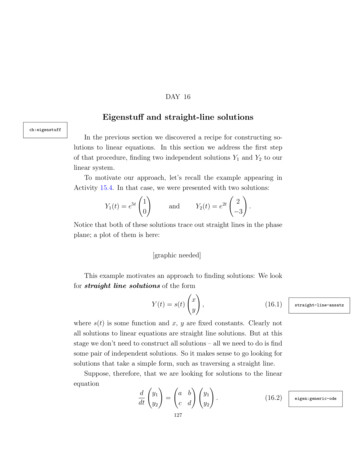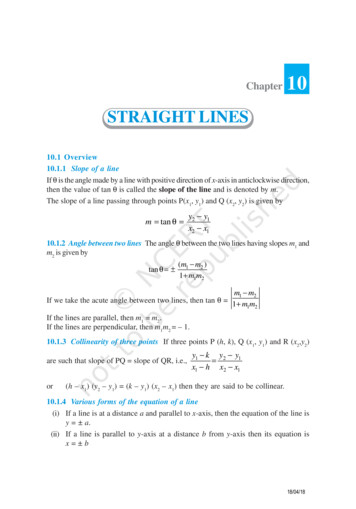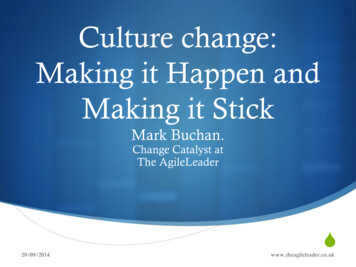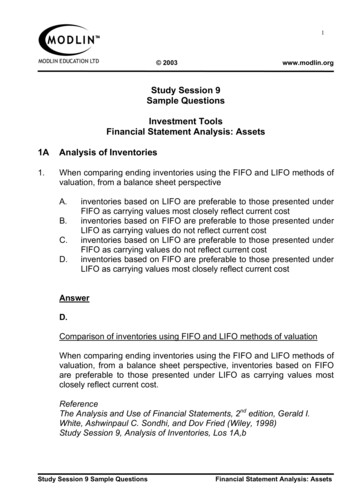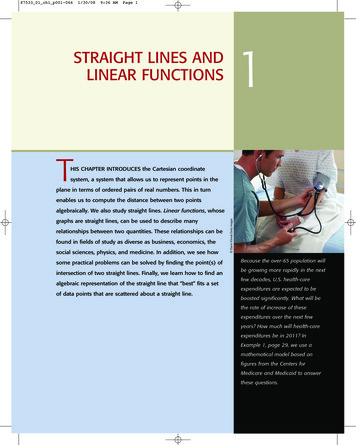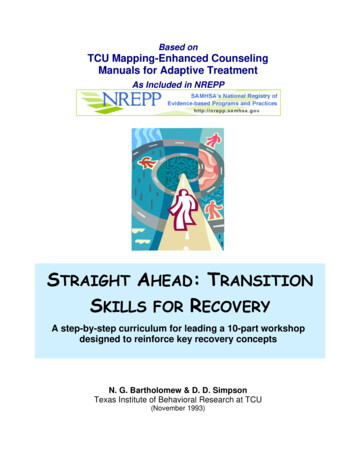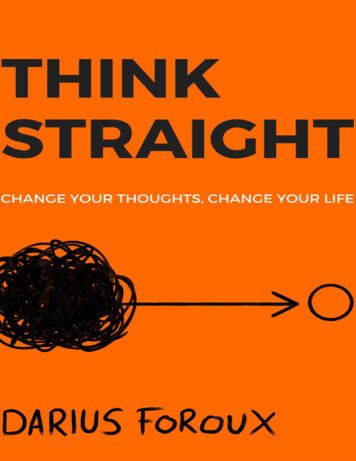
Transcription
THINKSTRAIGHTChange Your Thoughts, Change Your LifeWritten and Illustrated byDarius Foroux
Copyright 2017 by Darius Foroux, All Rights ReservedPublished by Darius Forouxwww.dariusforoux.comAll rights reserved. No part of this publication may be reproduced,distributed, or transmitted in any form or by any means, includingphotocopying, recording, or other electronic or mechanical methods, withoutthe prior written permission of the publisher, except in the case of briefquotations embodied in critical reviews and certain other noncommercial usespermitted by copyright law. The author of this book does not give medicaladvice or prescribe the use of any technique as a form of treatment forphysical, emotional or medical problems without the advice of a physician. Inthe case of depression, anxiety disorder, panic disorder or any otheremotional condition, consult your physician before using the techniquesdescribed in this book. The intent of the author is only to offer information ofa general nature to help you in your quest for better thinking. In the event youuse any of the information in this book for yourself, the author does notassume responsibility for your actions.
TABLE OF CONTENTSTable of ContentsAbout The Author (That’s Me)You Become What You ThinkWhy Do We Need A Book On Practical Thinking?Use What WorksClear Thinking Requires TrainingFrom Chaos To ClarityA (Very) Brief History Of ThinkingLife Is Not LinearConnect The DotsFilter Your ThoughtsStop “Thinking”Inside Your Control vs Outside Your ControlDon’t Trust Your MindLook At FactsTrue Vs UNTRUETake Your Time To ThinkNo More Quick DecisionsRelease Your MindDraw Your ThoughtsBe Yourself (Not What You Should Be)Take Time To ReflectMy Money RulesDon’t Try To Think Your Way Out Of EverythingBe Unconventional
Don’t Ask WhyThink About The Details Even MoreTake Thinking Out of The EquationDon’t Live With RegretsNever Look BackSpend Your Time WellInner CalmThink Beyond YourselfThank You: A GiftFurther Reading
ABOUT THE AUTHOR (THAT’S ME)I self-published this book, so it doesn’t make sense to write this part in thirdperson. To be honest, I did write an ego enhancing bio at first. I thought itlooked more professional. But after I gave it more thought, I decided to do itdifferently and introduce myself the same way I do at an informal event.Anyway, I’m an entrepreneur, blogger, and podcaster. For the past two and ahalf years, I’ve been sharing my thoughts about life, business, andproductivity on my blog. Until now, more than 3 million people have read myarticles. I also co-founded Vartex, a laundry technology company, with mydad, while I was finishing my master’s degree in Marketing in 2010. For mypodcast, The Darius Foroux Show, I’ve interviewed thought leaders likeRyan Holiday, Robert Sutton, Jimmy Soni, and more.
“If you can change your mind, you can change your life.”― William James
YOU BECOME WHAT YOU THINKIn 1869, a 27-year-old man, who had just graduated as a doctor of medicinefrom Harvard, was going through a “crisis of meaning.” This was not the firsttime he dealt with adversity. Throughout his six years in medical school, hiseducation was interrupted by different illnesses and bouts of depression. Butthis time, it was worse. He even contemplated suicide for months.The young man’s name was William James, who later became the leadingpsychologist in America and one of the founders of the philosophical schoolof pragmatism. It took James three years to overcome depression. Somethinghe did by himself. To be clear, James wasn’t just feeling down. JohnMcDermott, editor of The Writings of William James, wrote about theseverity of his mental state: “James spent a good part of life rationalizing hisdecision not to commit suicide.”During this time, James also had panic attacks and hallucinations. Thiswasn’t new to him. His father faced the same agonizing things, years beforehim. This feat made James believe that his condition was biological, andtherefore something he couldn’t overcome. But in 1870, James made apsychological breakthrough after reading an essay by Charles Renouvier, aFrench philosopher. In his journal, he wrote: “I think that yesterday was acrisis in my life. I finished the first part of Renouvier's second Essais and seeno reason why his definition of free will — 'the sustaining of a thoughtbecause I choose to when I might have other thoughts' — need be thedefinition of an illusion. At any rate, I will assume for the present — untilnext year — that it is no illusion. My first act of free will shall be to believein free will."
This realization is at the core of pragmatism, the school of philosophy thatJames and Charles Sanders Peirce founded, years later. James realized thatwe have the ability to choose one thought over the other. In other words, wecan control what we think.However, James doesn’t say we can control our consciousness. When we sitdown and observe our thoughts for a few minutes, we will notice that a lot ofthings flow through our mind. The thoughts are just “there.” Nothing we canchange about that. But since we have free will, we can decide which thoughtswe focus on. Hence, we can influence the direction of consciousness. Thisrealization is critical to the way we live. It’s the difference between “I can’thelp but feel this way” and “I feel this way because I decided to feel thisway.”The emphasis is on deciding. And that’s what this book is about: Withpractice, you can get better at controlling your thoughts so you candecide what you think.And with better control over our thoughts, we can improve the quality of ourlives and the outcome of our careers. That’s my proposition in this book.You have the ability to decide what you think. And since the result of yourlife depends on your thoughts, I think it’s the most important thing in life.When we improve the way we think, nothing is impossible to achieve. Thatsimple realization changes everything. Many great thinkers have writtenabout the importance of thoughts. But William James’ godfather, RalphWaldo Emerson, who also inspired James a great deal, put it most simply:“You become what you think about all day long.”I believe that’s true. But we must realize that actions follow thoughts. Thatmeans you can’t change your actions without changing your thoughts. Let’sstart!
WHY DO WE NEED A BOOK ONPRACTICAL THINKING?The human brain is the most important tool we have. It’s more important thanany technology, device, or instrument. Robert Greene, the author of Mastery,put it best: “If there is any instrument you must fall in love with and fetishize,it is the human brain—the most miraculous, awe-inspiring, informationprocessing tool devised in the known universe, with a complexity we can’teven begin to fathom, and with dimensional powers that far outstrip any pieceof technology in sophistication and usefulness.”However, there’s one problem. We’re born with this great tool, but we don’tknow how to use it properly. We’re highly impractical beings. We think thatwe’re good thinkers, but research paints a different picture. We think wemake practical decisions that we base on logic. But that’s not the case, as DanAriely, author of Predictable Irrationality, writes: “We usually think ofourselves as sitting in the driver's seat, with ultimate control over thedecisions we made and the direction our life takes; but, alas, this perceptionhas more to do with our desires—with how we want to view ourselves-thanwith reality.” (emphasis mine)It’s safe to say we’re not practical thinkers! The proof of that is the list ofmore than a hundred cognitive biases (or thinking errors) that scientists havefound over the last century. We often make decisions based on gut feelings,emotions, and without having the right information. I’ve read several booksabout better thinking and decision making. I liked them. But I had oneproblem with all the books in this field: They weren’t practical. They do agreat job of describing why we think the way we think by sharing stories. But
I couldn’t find a practical book that explained how to change the way youthink.That’s why I wrote this little book. It contains everything I’ve learned aboutthinking. My goal is to give you at least one idea that you can use to improveyour thoughts, and consequently, your life, business, or career. That’s why Ishare all my best ideas here. I wrote THINK STRAIGHT in a way that youcan read it more than once. And I hope this book serves as an anchor to you—especially during trying times.To keep this book practical, I combine theory, stories, and personalexperiences to share advice you can apply (or not). The first idea I want toshare is that these types of books only work if you’re open-minded. If youthink that’s not you right now, I can save you an hour of your life. Just get ridof this book. Burn it, ask for a refund, give it away, whatever. No matter whatyou do, decide clearly: Use it or leave it.
USE WHAT WORKSI’m not a neuroscientist, psychologist, philosopher, or any type of expert onthe topic of “thinking.” I’m a person who has lived his entire life under theimpression that you can’t control your thoughts. That way of thinking didn’tserve me well. I was happy one day, sad the next. I got angry easily. And Icouldn’t find solutions to simple challenges I faced in my career, business,and relationships. But through experience, journaling, reading, and a lot ofintrospection, I’ve found a way to get better at thinking.How do I know I’m better at thinking than before? I’m no longer a slave tomy thoughts and I’m much happier because of it. I use my mind, and it’s nolonger the other way around. To me, that’s the definition of better thinking. Ithas nothing to do with how smart you are or how many mathematicalequations you can solve. It’s about using your mind to get what you want.I don’t pretend to have all the answers to thinking better, though. However, Ido have the answers to how I’ve used nothing but my thoughts to live ahappier, healthier, wealthier, and more meaningful life.I’m the living proof of the “change your thoughts, change your life” idea.Only three short years ago, I was stressed out of my mind, gave up myentrepreneurial desires, and hated my life. I felt stuck. But I don’t want to betoo dramatic about my situation. I think we’ve all been there. And if youhaven’t felt stuck in your life, it’s only a matter of time before you will. It’s anatural part of modern day life. I’m not trying to scare you, though. But youknow how all these self-help books go, right? “I was down and out. I lost allmy money. I was depressed. My life sucked. But then I discovered X. Andthen my life changed.”
X is, of course, the idea they want to sell you. Since I'm honest with you, I’mno different. For example, in this book, I want to sell you on the idea ofuseful and useless thoughts. But there’s a difference. I’m giving you myperspective—nothing more. It’s up to you to decide what you’re going to dowith it.John Dewey, a pragmatist, and one of the fathers of functional psychology,famously said: “The true is that which works.” But that doesn’t mean weshould believe everything we hear or read. That makes us delusional.If we want to think straight at all times, we must stay grounded, look at facts,listen to other people’s perspectives, and only then draw practicalconclusions.
CLEAR THINKING REQUIRES TRAININGI view the mind as a muscle that requires regular training to keep strong. Oneway to train your mind is by learning new things. But I always thought thatlearning ends when your education ends. For some, that’s when they leavehigh school, for others, it’s when they get their bachelor’s or master’s degree.During our time in school, we learn new skills, ideas, and theories thatchange the way we think and operate in the world. But once we’veestablished a way of thinking, we hardly change it. We prefer to entertain thesame thoughts because they give us a sense of familiarity. We’ve learned thatnovelty is a scary thing—so we do everything to avoid it. We’re creatures ofhabit who prefer relaxing our mind instead of straining it. “I need to relaxand watch something on Netflix,” is something I hear almost everyone, of allages, say these days. I’ve said it myself as well.That makes me wonder what we need rest from? From the repetitive tasks wedo at work? From the familiar thought patterns we have? If you really thinkabout it, we hardly strain our minds unless there’s a specific reason—like atest or exam we have to take. Otherwise, we often think, “What’s the point?”Well, the point is to train your mind just like you train your body to keep fit.You don’t go to the gym for four years and quit for the rest of your life. Sowhy don’t you exercise your mind the same way you do your body?What’s more, the mind is the single most important tool you have. And if youwant to use that tool properly, you must train the mind. Stoic philosopherEpictetus put it best: “The life of wisdom is a life of reason. It is important tolearn how to think clearly. Clear thinking is not a haphazard enterprise. Itrequires proper training.”
The problem is that we don’t know how we must get proper training, asEpictetus put it. For most of my life, my thoughts were out of control. I neverthought about thinking. If you asked me to draw my thoughts, it would looksomething like this:That mess you see up there is how the inside of my mind looked like. It waspure chaos. Just a mush of positive, negative, sad, happy and, above all,confusing thoughts. I always thought to myself, “Why can’t my brain stop?Where’s the pause button?” Looking back, I didn’t know how to use mybrain as the wonderful tool it is.
FROM CHAOS TO CLARITYIn 2014, I moved to London from Leeuwarden, The Netherlands, the citywhere I grew up. I went from a city with a hundred thousand people to a citywhere seven million people live. Things were harder than I expected.Especially when it came to finding a place to live. After doing research andtalking to my new co-workers, I learned that it was almost impossible to findan apartment in a short period without getting ripped off. Instead, I decided torent a room (which was a lot easier) for three months. And I decided toexplore different areas in London that were within an hour commute bypublic transportation to my work. That was my plan. And everything wentwell. At first.After two months, I found a small and affordable one-bedroom apartment inEarlsfield, in South-West London. I had planned everything. I canceled thelease of the room I rented, and signed the lease for the new apartment. Myparents and brother even drove over from Holland to help out. And because Ididn’t have much stuff, we could just use their car to move my things fromthe old place to the new place, which were only 10 minutes apart.In my mind, this would be the deal: I would just pack up my stuff, get the keyto the new place, hand the keys back to the old landlord, and move into thenew place, watch Netflix and relax. Also, I expected to do everything on thesame day.Well, things didn’t go as planned after all. My new landlady changed hermind last minute and decided not to rent out her apartment. She told me this aday before the day I planned the move. All of a sudden, I had no place to liveand had an SUV full of my things. That night, in my parents’ hotel room, I
panicked. Big time.“I don’t know what to do! I have no place, my stuff is in a van, I brought youguys over from Holland, and now I’m sitting here like an idiot.”I continued blaming myself for the rest of the day and evening. You’reprobably thinking, “Really?” Yes, looking back on this, I can’t help but thinkthat I may have acted a little bit too dramatic. Well, let’s just call it like itwas: I was overdramatic. And not just a little. That’s exactly why I picked outthis example because it shows how stupid I was in my thinking. I spent somuch time in my head that I had lost sight of the situation. I wasn’t thinkingclearly. And for what? Some first world problem? C’mon.The next day, I woke up, and with the encouragements of my parents andbrother, I decided to stop feeling sorry for myself and to start finding asolution instead. I said to myself, “THINK STRAIGHT.”I knew I had to replace the mess with clarity. I wanted to get straight to thepoint. I pictured this:On the left: A mush of useless thoughts: Worry, stress, suffering, confusion,not knowing what to do.
On the right: ONE straight thought that has a (single) useful purpose. Iwanted to start using my mind as a tool. In the case of my London story, Ineeded to look for a solution—fast.It turned out that was easy, once I started thinking straight. I booked anAirbnb until I found a new place. In the end, we stayed in an Airbnb for aweek. The landlady changed her mind again and decided to rent theapartment to me anyway.So, all my stressing, worrying, and thinking were especially useless. Howoften does that happen? We’re always so quick to judge and drawconclusions based on our assumptions. We’re all human beings. We makemistakes. We change our minds. And we assume things that are not true allthe time. That’s normal. What’s not normal is to let your mind go out ofcontrol.And after many other useless thinking episodes, I decided to change. I didn’thave one big epiphany or super dramatic moment that forced me to change.Life is not a Hollywood drama. People that I know only change after aculmination of problems. At some point, we stand up and say, “Enough.”And you know what? A lot of people never change at all. But that shouldn’tbe our concern.After years of chaos in my mind, I just had enough of mental suffering. Ican’t make it any prettier than that. You don’t need an “all is lost” moment.Those type of moments almost never happen.About two years ago, I started changing my thoughts. And I’ve learned toreplace the chaos in my mind with clarity. Now, there’s peace. In the rest ofthis book, I’ll share with you exactly how I did it. But first, I want to share abrief history of thinking.
A (VERY) BRIEF HISTORY OF THINKINGThoughts are important. But not all thoughts are equal. The quality of yourthoughts matters the most. Roman Emperor and Stoic philosopher, MarcusAurelius said it best: “The universe is change; our life is what our thoughtsmake it.”A quick look at our surroundings shows us that life is changing faster thanever. Jobs disappear, smartphones turn you into a zombie, education costsyou thousands, the cost of living increases rapidly, salaries don’t, you haveless time for yourself, and so on. Life changes so fast that it seems like youwake up in a new world every day! What do your thoughts make of that? Ifyou’re anything like me, these developments cause a lot of thinking, akaworrying and uncertainty. How do I survive? How do I adapt my business tochanging markets? How do I advance my career? How do I not lose mymind? Mastering your thoughts is challenging.The desire to master our thoughts is as old as modern civilization. Ever sincethe fifth century BC, philosophers from all ages and regions agree on onething: The human mind is an instrument that solves problems. And manyphilosophers argue that the quality of your thoughts determine the quality ofyour life. From Confucius to Socrates to Descartes to William James, they alltalk about their method of thinking—a way to view the world.Most of us know the Socratic method of questioning everything, evenyourself. “I know one thing: That I know nothing,” is what Socrates famouslytold the Oracle of Delphi when Socrates was declared the wisest man onearth. The fact that he thinks that he knows nothing makes him wise. That’s away of thinking.
French philosopher René Descartes, who lived in the 17th century, took it onestep further. He questioned everything in life, even his own existence.Because how do you know you’re not dreaming or living in The Matrix?That’s why he famously said: “Cogito ergo sum.” Popularly translated to, “Ithink, therefore I am.” Descartes concluded that he must exist because he’sable to think.No matter how crazy your thoughts are, it’s safe to say that you do exist. Sowhy not make your existence a little more practical, lighthearted, fun, anduseful?Have you ever observed or written down your thoughts? I challenge you, tryit for a day. Every two hours or so, sit down and write about what you’rethinking at that very moment. Just don’t get scared of yourself. Most of ourthoughts make no sense at all. We’re conflicted as a species. Descartes alsoreviewed his own thoughts and found many contradictions. His mostimportant idea is that we should question the source of our beliefs, not thebelief itself. Because most of our beliefs are based on our or other people’sperception.How many of your ideas are based on what others have told you? Or basedon your first thoughts or assumptions? At the core of thinking lies our abilityto separate the truth from falsehood. What is true, what is false?One way to look at that question is to take a pragmatic perspective. WilliamJames describes the idea of pragmatism as follows: “The attitude of lookingaway from first things, principles, 'categories,' supposed necessities; and oflooking towards last things, fruits, consequences, facts.” Thoughts shouldserve a useful purpose. If they don’t, they’re useless. That’s straightthinking.
Pragmatism is a method of thinking, not a solution. In fact, all thinking is amethod. Your thoughts serve as an instrument. But it’s a conflictinginstrument that’s very hard to use. Henry Ford said it best: “Thinking is thehardest work there is, which is probably the reason why so few engage in it.”Thinking is not only hard—it’s the single most important thing in life.Remember: The quality of our thoughts determines the quality of our lives.And our decisions are a result of our thoughts.
LIFE IS NOT LINEARI always thought in a linear way: A leads to B. And if B is C, A also leads toC. I looked at appearances, first thoughts, and made a lot assumptions. Butmy thoughts didn’t serve a useful purpose. In fact, they served no purpose atall. Instead of thinking, I followed convention. I let others do the thinking forme. Most of us are like that. For example, I thought I would never have toworry about having a job if I got my college degree. I honestly believed thatuntil I was about 26 years old. I figured out the hard way that nothing isguaranteed in life and that you have to work hard to earn money. And thatmaking money has nothing to do with your degrees. If I had to pick anotherpredictor of career success I would say it’s skills. The better you are atsomething, the more value you can provide to others, and the more moneypeople are willing to pay in exchange for your value.Also, achieving a goal never happens linearly. Most of us believe there’s astraight line from where you are to where you want to be. Let’s say your goalis to start a business so you can have more freedom in your life. That wasalways my goal. I thought I would just work on it until I achieved it.
But that’s not how it worked out. I had to take a lot of detours. I worked formany other people in between. I also started businesses that failed.Understanding that life is not linear helps us to change the way we think.Along the way, I got discouraged a lot and almost quit. Now, I realize thatthings often don’t go according to plan. That helps me to think of backupplans or alternative options to get closer to my goals.Another personal goal of mine was to invest in real estate. When I lived inLondon and Amsterdam, that was difficult for me because I didn’t haveenough capital to get started. So instead of putting a lot of pressure on myselfto make more money and sacrifice the quality of my life, I started lookingelsewhere. After researching growing real estate markets, I ended up in myhometown. Prices were low, I knew a lot of people, the population was
increasing, and the city invested a lot in new businesses and education. Twomonths after I decided to look elsewhere, I bought my first deal there. Thepoint is that there are multiple ways to achieve your goals. Also, if everyoneis doing one thing, that often means you shouldn’t.
CONNECT THE DOTSYour brain is constantly working, even when you’re not actively thinking.Apart from managing all the vital functions of your body, the brain also scansevery piece of information that comes in. The brain compares it with otherinformation that it has already stored. Your brain searches for similarities anddifferences between that information. That’s how we think and use our brainto come up with new ideas. The brain consists of many small networks ofneurons that connect to other networks, like this:Just a basic understanding of how my brain works helps me to understandhow I can nurture it. I don’t worry about finding a direct application for
information I acquire. I feed my brain with knowledge that I’m curious about.And that diverse information might be stored in different networks, but aslong as I connect the dots later, I’m okay with that. Like Steve Jobs said,“You can't connect the dots looking forward; you can only connect themlooking backward. So you have to trust that the dots will somehow connect inyour future.”If you want the dots to connect in the future, you have the make sure youform dots in your brain. The only way you form dots is by learning, doing,making mistakes, reflecting, or anything you can do to feed your brain withthe input it needs to give you the output you want.
FILTER YOUR THOUGHTSThere’s too much information in the world for our brain to process. So, we’reforced to filter it. If we don’t, we go nuts! And in that filtering-process, wedevelop shortcuts to ease the cognitive load of making decisions.These shortcuts are called heuristics. A heuristic is a strategy we derive fromprevious experience with a similar problem. One heuristic that everyoneknows is “trial and error,” a strategy for finding answers to problems we face.It’s also a way of thinking. But trial and error is not always the most practicalstrategy. If we would rely on trial and error to build a career, we wouldprobably die before achieving that goal. Life is too short for applying trialand error to everything.Another heuristic that’s not practical is “social proof.” We often makedecisions based on what others do or say. And my favorite heuristic is“familiarity.” It says that past behavior that led to good results is not aguarantee for future results. The familiarity heuristic also explains why wefavor things and places we know over novelty. It’s one of those things we seeevery day. We eat the same things, we walk the same route, we make thesame mistakes, and we complete the same tasks at work. Over and overagain. And then, we complain that our lives are stuck or boring. No wonder,you’re making decisions based on familiarity. But who says that familiarity isalways a good thing? It’s good for certainty. But to achieve a breakthrough,you need something different.Making decisions based on heuristic techniques might ease the cognitiveload, but they are far from practical. And often, heuristics lead to unsatisfyingoutcomes. If that’s the case, take it as a sign that you must change something.
Instead of relying on heuristics to filter information and make decisions, relyon the main idea of pragmatism: True is what works. But don’t take it tooliterally. “Taking drugs works for me,” is what a contentious friend told meafter I shared this idea with him. And he’s right—you can’t take this idea tooliterally. But what can you take literally in life? Take the platitude, “Goodthings come to those who wait,” for example. I don’t have to explain that itdoesn’t mean you should sit at home and wait forever until “good things”happen.Look at the “true is what works” idea as a filter that you can apply to all theinformation that goes into your brain.When faced with decisions, I ask myself: “Will the outcome of a decisionchange the way I live?” If you ask that yourself consistently, you’ll find that
you automatically filter out useless information and only make decisions thathave an actual impact on the outcome of your life. You force yourself to usewhatever works—what’s useful. And what impacts your habits.For example, conventional thinking says that bigger cities also bring youbigger opportunities. I really thought that was true. That’s even the mainreason I moved to London. And yes, I did seize a big opportunity for me atthe time. But I also had bigger responsibilities and problems. Also, I don’tlike big cities. I hate crowded places, dirty air, and unreasonably high cost ofliving. Clearly, living in a big city didn’t work for me. That way of thinkinghad a negative impact on the way I lived. That’s why I eventually movedback to Leeuwarden. It’s quiet, I know a lot of people here, I can work less,make more, and I can drive anywhere in the city within ten minutes.However, I also realize that for most people, my way of living doesn’t work.They might find it boring or not exciting enough. So what? Do what worksfor you.
STOP “THINKING”Thinking is difficult. I never knew how to stop. It’s easy to stay inside yourhead for hours, especially when you’re in bed at night. But I can confidentlysay that 99% of all my thoughts in the past have been useless. I didn’t doanything with my thoughts most of the time. I didn’t solve a problem. Nordid I try to understand difficult ideas or concepts from books. I spent a lot oftime in my head doing this:I called that thinking. But it was more like worrying, stressing, freaking out— call it whatever you want. I call it a preoccupied mind. And with what?And the list goes on:
“I wonder what my boss thinks?”“What happens if I screw up and lose my job?”“I think he doesn’t care about me.”“I just keep failing.”“Does she love me?”“Why does my life suck?”“Why is my life awesome, and other people’s lives are not?
It’s about using your mind to get what you want. I don’t pretend to have all the answers to thinking better, though. However, I do have the answers to how I’ve used nothing but my thoughts to live a happier, healthier, wealthier, and more meaningful life. I’m the living proof of the “chang

